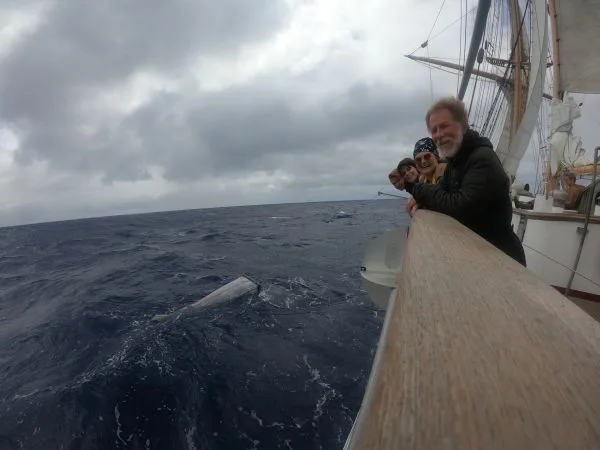Programs Blog
Keeping an Eye Out

Author: Emily Matthews, A Watch, Washington and Lee University
Ship’s Log
Position
32°15.85’N x 141°24.26’W
Heading
290 degrees
Speed
6.3 knots
Sail Plan
Storm trys’l, main stays’l, fore stays’l, jib
Weather
Mostly cloudy, some sun
Wind
NExE, Baufort force 6
Description of location
North pacific subtropical gyre
Yesterday on deck, the mains’l came down and the storm tris’l went up in its place. It’s been steadily cloudy since leaving San Diego, and over the past 24 hours our winds and seas are building quick. I just got off morning watch, my second watch with our new watch officers, and the conditions during our science station were rather sporty. We weren’t able to safely deploy our hydrocast to get water property data from depth, but we still were able to jibe and get the Neuston tow in the water for 25 minutes. During watch I shadowed my assistant scientist, Emily, and got a behind-the-scenes glimpse at all of the lab responsibilities that need to get done for each hour, and more details for the Neuston tow and surface station.
 My current favorite place on the ship.
My current favorite place on the ship.
My favorite part of life on board is standing as the forward lookout. On bright days with thin clouds you can see so far in every direction. I used to report ‘nothing on the horizon’ when I was relieved during rotations after gazing at the sea for an hour. During a watch debrief with my old watch officer and chief mate, Ava, they described their view from aloft up the main mast as being able to see everything. I felt a deep perspective shift during my next lookout, because everything truly is out there. We are one 134-foot steel hulled vessel sailing through the largest ocean on earth, and from the elevated platform on the bow, anything I could possibly imagine is contained within the expanse of sea and sky that envelope our days.
For similar reasons I like looking at the CHIRP data in lab that displays a cute cross-section of the ocean floor. The Pacific is full of mountains unimaginably larger than Everest; this raw geologic beauty below us is only getting me more attached to life at sea. Our days are structured, our responsibilities are growing, our time feels both limited and endless, but everything we do on board feels purposeful. Everything happens for a reason, and there is always a reason for our actions at sea. The necessity of working pre-emptively and mitigating problems before they happen has shown me a balance that works. Our chief engineer Henry often says, ‘take care of the ship and the ship will take care of us.’ We live by that and are able to thrive out here in the ocean.
The swells are increasing, the ship is rocking, and it all makes me think of Whitman when he wrote, “These are the days that must happen to you.” I’ve felt so wholly alive for the past 14 days, in every waking and sleeping moment. I’m saving memories of the moments looking into the sea and sky, of the jellyfish, dolphins, plastic, clouds, sunsets, stars, and Venus. I can’t wait to share them with you all when I get home, and I hope everyone out there finds a way to feel alive in this world.
– Emily Matthews, Washington and Lee University / A watch 🙂
Contact: Douglas Karlson, Director of Communications, 508-444-1918 | [email protected]
Recent Posts from the Ships
- SEA Writer 2022, Magazines From the Summer SEA Quest Students
- PIPA Alumni Reconnect with Children of Kanton
- Woods Hole Welcomes Incoming Class of PEP Students
- Muhlenberg Student Finds Perfect Study Abroad Experience with SEA Semester
- SEA Student Describes Pacific Exploration for University of Denver News
Programs
- Gap Year
- Ocean Exploration
- High School
- Science at SEA
- SEA Expedition
- SEAScape
- Pre-College
- Proctor Ocean Classroom
- Protecting the Phoenix Islands
- Sargassum Ecosystem
- SPICE
- Stanford@SEA
- Undergraduate
- Climate and Society
- Climate Change and Coastal Resilience
- Coral Reef Conservation
- Marine Biodiversity and Conservation
- MBL
- Ocean Exploration: Plastics
- Ocean Policy: Marine Protected Areas
- Oceans and Climate
- Pacific Reef Expedition
- S-299 Summer Session
- The Global Ocean: Hawai'i
- The Global Ocean: New Zealand